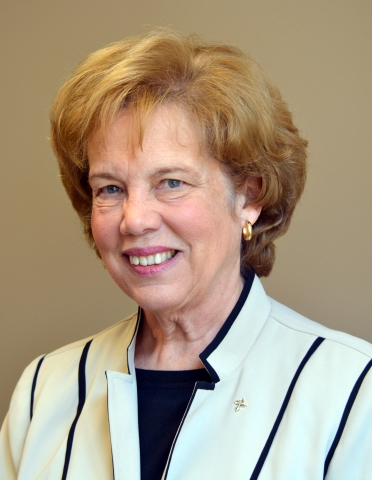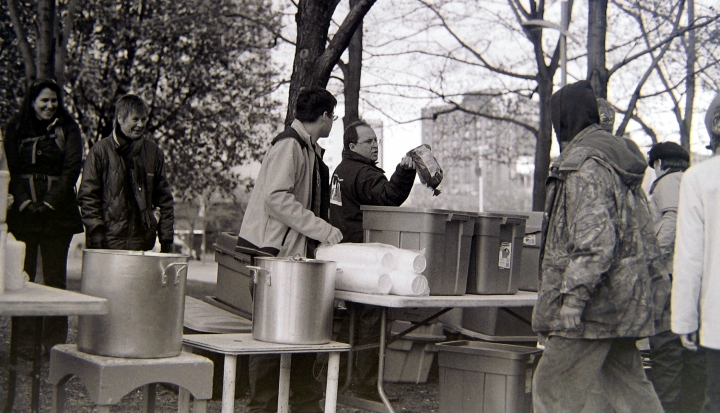Catholic Charities USA (CCUSA) serves between eight and nine million vulnerable people every year from all ethnic and religious backgrounds. In 2015 CCUSA named Adrian Dominican Sister Donna Markham as the first female president in the organization’s history. A board certified clinical psychologist as well as former president of both the Behavioral Health Institute for Mercy Health system of Ohio and Kentucky and the Southdown Institute in Ontario, Canada, Sister Donna has dedicated her life to working for and with people who are struggling. While a multitude of issues have been discussed or debated during this election year, poverty hasn’t been at the forefront. This can be frustrating for someone running a national humanitarian relief organization. The U.S. Catholic editors interviewed Sister Donna about the challenges of navigating American politics to help bring persons and families out of poverty and her vision for the future of CCUSA.

What challenges does Catholic Charities USA face navigating politics today?
Catholic Charities USA (CCUSA) works to inform policymakers on both sides of the aisle about the moral imperative to protect and promote human dignity. We especially focus attention on those persons and families who are poor, vulnerable, or marginalized. That’s the big picture.
What is perhaps most challenging right now is that although the candidates in general talk about various economic concerns, the discourse is primarily focused on middle-income families, and oftentimes the issue of persons, families, and communities most severely impacted by poverty doesn’t seem to get a lot of attention.
Together with the Circle of Protection—an ecumenical group of leaders of faith based organizations focused on protecting the social safety net—we issued an invitation to everyone who was in the primary elections running for their particular party to make a video on how they would address poverty should they be elected President of the United States. Those videos have been collected and are on the website of Circle of Protection. To my knowledge, most of the candidates responded.
It’s always a struggle because the middle class is easier to talk about in some ways than the extremely poor and vulnerable. That’s our challenge. Nonetheless, we will continue to do so.
How do people’s political ideologies affect how they think poverty should be addressed?
Rather than put it into an ideological framework, my sense is that a lot of people’s perceptions are formed by where they’ve walked. Many legislators have worked diligently to know the struggles of people in their districts or their states. When our leaders have walked in another’s shoes and have seen the challenges poor folks face, their opinions often shift.
People who have not had any experience with people who are poor or vulnerable tend to think more objectively about the situation and sometimes can move toward blaming the person for being unemployed or poor. It’s more about where we have walked than it is necessarily an ideological preference.
Can addressing poverty bring people together?
Yes. That’s basically what we try to do. We have considerable credibility when we speak because we speak from the perspective of the people whose lives are most deeply affected by poverty. Back in February, I met with members of the House and Senate at a reception hosted jointly by House Minority Leader Nancy Pelosi and Speaker of the House, Paul Ryan. I proposed three areas on which we could work together in a bipartisan way: poverty reduction and alleviation, mental health reform, and prison sentencing reform.
Catholic Charities is always willing to stand as “Switzerland” to convene those conversations that promote dialogue across the aisle on major issues. Many of our Catholic legislators are both attuned to and willing to discuss these issues. Our experience has been positive in their desire to work together with us, although the work is certainly very challenging.
Three major Catholic service agencies are all lead by women. What does this say about Catholic women and the church in the United States?
It is a strong witness to the church in the United States that certainly women are as capable as any men in running large organizations. All three of us—Sister Carol Keehan from Catholic Health Association, Carolyn Woo from Catholic Relief Services, and myself—come from substantial experiences in leadership. Whether it be health care, education, or business, we came with a fairly strong backgrounds that prepared us to serve in our current positions.
What’s your vision for the future of Catholic Charities USA?
We have recently completed a comprehensive strategic planning process engaging Catholic Charities leaders across the country. Our diocesan directors identified priorities and articulated our vision for the next five years. Those priorities are: affordable housing; immigration and refugee services; integrated health (mental health, physical health, and nutrition); leadership formation and Catholic identity; disaster services; social enterprise development; and social policy advocacy. We will be concentrating our efforts in these areas because people who are struggling are crying out to us for help. We consider our work as sacred—to be able to extend compassion and care to those who are in need and to advocate for changes in the systems that result in poverty.
Header image: Flickr cc via Gerry Lauzon
Image: Sister Donna Markham















Add comment